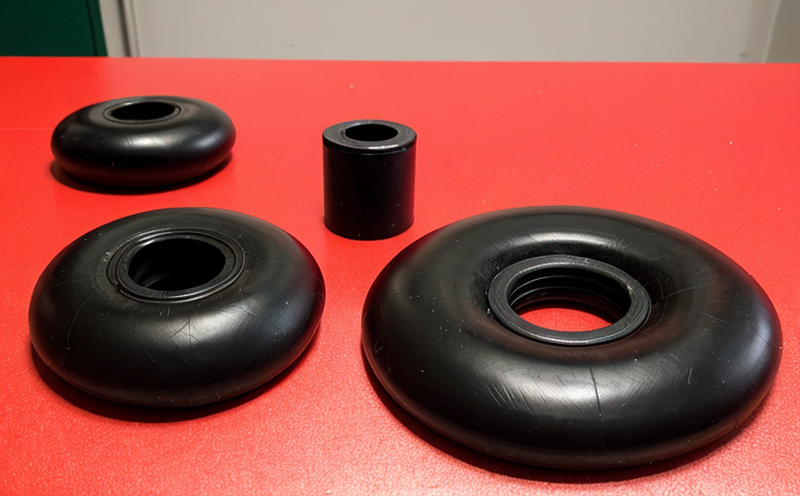IEC 60243 Dielectric Strength Testing of Rubber
The International Electrotechnical Commission (IEC) standard IEC 60243 specifies the test method for measuring dielectric strength in rubber and elastomers. This test is crucial for ensuring that electrical insulation materials, such as those used in cables, transformers, and other high-voltage applications, meet safety standards.
The test involves applying an alternating voltage across a specimen of rubber or elastomer until it breaks down, resulting in a short circuit. The dielectric strength is measured in volts per millimeter (V/mm) and provides critical information about the breakdown behavior under electrical stress. This data is vital for preventing failures that could lead to fires or other dangerous situations.
The test method requires careful preparation of the sample, which should be free from air bubbles, cracks, or other defects that could affect the test results. The specimen is typically a flat plate made from the material under test and must have uniform thickness throughout its cross-section. Proper clamping ensures that the electric field is applied uniformly across the specimen.
The IEC 60243 test setup includes a high-voltage generator, an inductively coupled system for voltage regulation, and a discharge device to protect the measurement equipment from overvoltages. The test involves applying increasing voltage at a constant rate until the specimen breaks down. The breakdown voltage is recorded, and the process is repeated multiple times to ensure consistency.
The dielectric strength of rubber can vary depending on factors such as temperature, humidity, and the type of vulcanization used in production. For instance, natural rubber has a lower dielectric strength than synthetic rubbers like neoprene or butyl rubber. Understanding these variations is crucial for selecting the appropriate material for high-voltage applications.
The test results provide valuable insights into the performance of rubber-based insulation materials under electrical stress. This information is essential for quality assurance and compliance with international safety standards such as IEC 60243-1, which covers the general principles and methods for dielectric strength tests on solid insulating materials.
By conducting this test, manufacturers can ensure that their products meet the required standards and avoid potential hazards. The test is particularly important in industries where electrical insulation plays a critical role, such as aerospace, automotive, and power generation.
| Application Area | Description |
|---|---|
| Aerospace Industry | Rubber-based insulation in aircraft wiring and connectors. |
| Automotive Sector | Electrical harnesses for electric vehicles (EVs). |
| Petroleum & Chemical Industry | Rubber-lined equipment for handling hazardous materials. |
| Telecommunications | Incumbent and non-incumbent applications requiring high-voltage insulation. |
Industry Applications
The IEC 60243 dielectric strength test is widely used across various industries where electrical insulation plays a critical role. Below are some key applications:
| Application Area | Description |
|---|---|
| Aerospace Industry | Rubber-based insulation in aircraft wiring and connectors. |
| Automotive Sector | Electrical harnesses for electric vehicles (EVs). |
| Petroleum & Chemical Industry | Rubber-lined equipment for handling hazardous materials. |
| Telecommunications | Incumbent and non-incumbent applications requiring high-voltage insulation. |
Eurolab Advantages
EuroLab offers a comprehensive range of services to ensure that your rubber and elastomer materials meet the stringent requirements set by IEC 60243. Our state-of-the-art facilities provide accurate, reliable testing that meets international standards.
We employ highly skilled technicians with extensive experience in material characterization and electrical insulation testing. Our team adheres to strict quality control procedures to ensure consistent results across all tests. Additionally, we offer flexible scheduling options to accommodate your production timelines.
Our commitment to excellence is reflected in our adherence to international standards such as IEC 60243-1 and ISO/IEC 17025. By choosing EuroLab for your dielectric strength testing needs, you can be confident that your products will meet the highest quality and safety standards.
We also provide detailed reports with comprehensive data analysis to help you make informed decisions about material selection and product design. Our experienced engineers are available to discuss test results and offer recommendations based on industry best practices.
Why Choose This Test
The IEC 60243 dielectric strength test is essential for ensuring the safety and reliability of electrical insulation materials used in high-voltage applications. By conducting this test, manufacturers can:
- Ensure compliance with international standards such as IEC 60243-1.
- Identify potential weaknesses in rubber-based insulation materials before they are incorporated into products.
- Promote product safety and prevent accidents or failures that could lead to fires or other hazards.
- Optimize material selection based on dielectric strength data, leading to cost-effective solutions without compromising performance.





